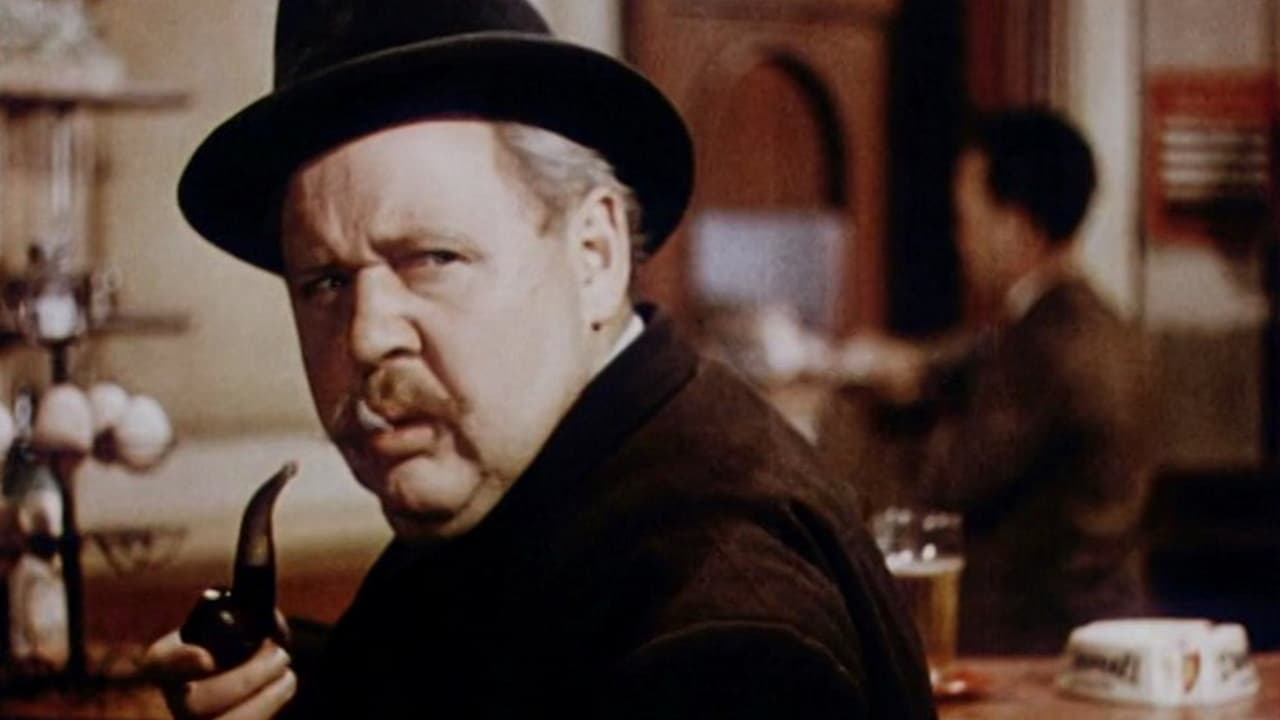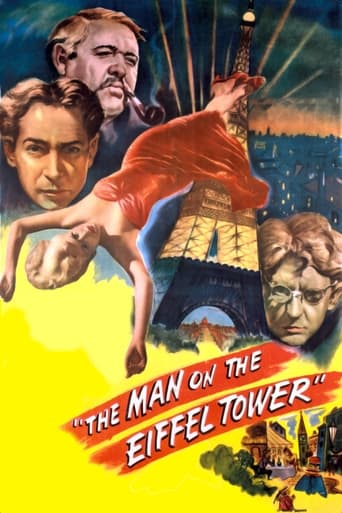



The greatest movie ever!
if their story seems completely bonkers, almost like a feverish work of fiction, you ain't heard nothing yet.
View MoreBlistering performances.
An old-fashioned movie made with new-fashioned finesse.
View MoreExecutive producers: Irving Allen and Franchot Tone. Copyright 31 December 1949 by Allen and Tone Film Productions, Inc. Made in association with Gray Film. An Irving Allen-Franchot Tone Production, released in the U.S.A. and Australia through RKO Radio Pictures, Inc. New York opening at the Criterion: 28 January 1950. U.S. release: 4 February 1950. U.K. release (through British Lion): 11 December 1950. Australian release: 16 February 1951. U.S. running time: 97 minutes. Australian length: 8,278 feet. 92 minutes.SYNOPSIS: Inspector Maigret outwits a hired killer. Setting: Paris. Time: 1949.COMMENT: Not only is this the only film wholly directed by Burgess Meredith, but at the time it was the only English-language Maigret picture. So The Man on the Eiffel Tower has a double curiosity value that would make it worth seeing even if it deserved its poor reputation.Of course that poor repute is totally undeserved anyway. The script is colorful and exciting and allows for splendid chases through the streets and over the roof tops of Paris, culminating in some amazingly daredevil stuntwork on top of the Eiffel Tower itself. Plucky Burgess Meredith even does many of his own stunts, including a leap from the top of a moving elevator that would do Douglas Fairbanks proud. If his performance is a trifle mannered, he makes up for it in inventive direction (assisted by Cortez's solidly atmospheric lighting) and inspired use of exciting Parisian locations.We have to wait a while for the main stars of this Simenon war of nerves to appear. A few of the lesser players like Hutton, Wallace (looking very glamorous) and Roc set the stage and then on comes Laughton - no Frenchman certainly but still a Maigret to the manner born. You can keep Pierre Renoir and Harry Baur and Jean Gabin. I'll take Laughton's sly, courteous, unflappable, jovial, concerned, conscientious Maigret as proof positive that superior acting overcomes national barriers. The consummate ease and naturalness with which Laughton invests his well-rounded characterization becomes even more apparent when we realize - thanks to the ineptitude of a couple of the other players - that all the dialogue has been post-synched and (in a few glaringly obvious cases) dubbed.Franchot Tone in an unusually unsympathetic role is also most convincing as the intellectual killer - a man who can size up his victim's weaknesses and use them for his own bitter ends.A pity Simenon's original French title, "A Man's Head", was not used. It has a double meaning which perfectly describes this bizarre, fascinating tale. If there be shortcomings in the picturization, they are of a minor, technical nature. The story moves fast, it is directed with considerable flair which makes atmospheric and thrilling use of a whole host of natural Parisian locations (the city is even billed as one of the "stars" of the film), it is edited with breathtaking pungency and is further enhanced by a rousingly suspenseful yet romantic music score by Michel Michelet.
View More"The Man on the Eiffel Tower" is in the public domain. Because of this, the film is owned by no one and it's hardly likely anyone would ever think of restoring it. It's a shame, as the color print is a mess--so faded it almost looks like it was filmed in sepia!This film is a strange murder mystery that is investigated by the famed French detective, Inspector Maigret (Charles Laughton). It's an odd one. On one hand, they've caught a guy who was clearly in the house around the time of the murder (Burgess Meredith). However, he seems an unlikely man to have butchered the two women in the home. Instead, it is possible that the rich lady's heir might have had something to do with it. Additionally, a really loopy guy (Franchot Tone) sure acts guilty--but they have nothing on him. What's next? See the film...or don't bother.The reason I wanted to watch the film is that I am currently in Paris and just last night went on the Eiffel Tower--so it sure seemed like an opportune moment. However, in addition to a dirty print, the film's problems often overshadowed the good. As for the good, the performance by Laughton was nice and seeing the actual streets of Paris was very nice. But, on the other hand, Tone's performance was so ridiculously over the top that it looked almost like it was meant as a comedy---but it wasn't. Plus, the finale on the Eiffel Tower SHOULD have been better but seeing Tone climb the tower faster than any marathon runner was utterly ridiculous! All in all, a film that isn't bad...it just isn't very good either.
View MoreWhile perhaps not all that good, The Man on the Eiffel Tower is nonetheless entertaining and not nearly as bad as some have offered. Yes, the direction is less than inspiring throughout much of the picture. Burgess Meredith doesn't really seem to get a grasp on creating tension but more importantly some kind of depth for his characters. Charles Laughton, the rotund actor who I personally have never seen give a bad performance, plays the legendary Inspector Maigret from the Georges Simenon novels. I have not read them and therefore an ill-equipped to make any comparisons. I do think Laughton gave the best performance in the film even though, yes, you might say if was a bit off-kilter and subdued even for him. Meredith plays his typical milquetoast individual with workmanlike skill, and Franchot Tone gives at sometimes a very creepy, erratic, unnerving performance as the titular man of the film. The city shots of Paris, though my copy had a somewhat grainy color quality, were impressive and the denouement at the Eiffel Tower easily was the film's most noteworthy attribute. This film was just engaging enough to interest me and it is populated with an above-average cast.
View MoreAs I started watching The Man On the Eiffel Tower it looked like it was going to go in the direction of Alfred Hitchcock's Strangers on a Train. Robert Hutton is having a sit down with his wife Patricia Roc and his mistress Jean Wallace in a Paris cafe. He gets an offer from Franchot Tone who was all ears that he'd kill Hutton's aunt who controls the family pursestrings so that Hutton could be independent. Tone doesn't lack for chops. He not only does the deed with a maid thrown in for good measure, he manages to pin the crime on milquetoast Burgess Meredith who just happened on the scene. Fortunately police inspector Maigret as played by Charles Laughton doesn't buy the pat scenario. He turns up Tone as a suspect, but he can't quite pin it on him. Tone's character reeks of Nietzchean superiority and France had just gotten liberated from a country that bought into that philosophy. Probably for today's audience, especially an American one, that particular dynamic can't be appreciated.Even an escape allowed by the Paris police by Meredith blows up in Laughton's face and threatens to ruin the career of Inspector Maigret. Fortunately Laughton has a few tricks up his sleeve.What we have in The Man On the Eiffel Tower is three very distinguished players from stage and screen who got together and made the film almost as a lark. Tone spent his entire film career trying to get out from under typecasting as a debonair gentleman in tails who usually loses the girl in the end to a bigger name. Right after this was done Franchot Tone did exactly that role in Frank Capra's Here Comes the Groom. His role here as Radek is certainly miles away from his usual parts. Tone produced this as he also produced another independent film the year before, Jigsaw, which was shot in New York.He got friend Burgess Meredith to direct and play the stooge. The story unfortunately does sag at times until the climax chase scene on the Eiffel Tower. That whole sequence is almost like The Third Man except where Harry Lime seeks escape in the sewers of Vienna, superman Tone leads his pursuers up the Eiffel Tower. In the end though he's not quite the superman he thinks he is.Charles Laughton made a nice Inspector Maigret. This is the second French police inspector of literature he's done. But there sure is a world of difference between Maigret and Javert of Les Miserables. In fact Laughton is far more like Sir Wilfred Robards in Witness for the Prosecution than Javert. It's too bad that director Meredith didn't have the kind of computer generated special effects and had to rely on brave stunt men and actors to do the job. If Man on the Eiffel Tower were filmed today, I'm sure it would have been far better. This criticism is almost a cliché, but Alfred Hitchcock could have really done something with The Man on the Eiffel Tower.
View More